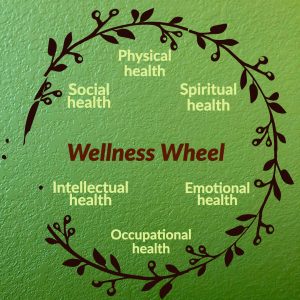Oakland, CA – Using a Wellness Wheel to Increase Health and Resilience
Posted in: Industry News
One of the most important aspects of developing a healthy lifestyle involves understanding what health is. Many of us think of exercise and a good diet. We might also think about getting a full night’s sleep and finding ways to lower the stress in our lives. Or, we might think about well visits with our general practitioner and receiving a clean bill of health based on bloodwork and a physical.
 However, a broader look at health leads us to consider not just physical health but also emotional and spiritual health, occupational health, intellectual health, and social health. When our life is robust across these six parameters (known as the wellness wheel) we are more able to cope with any negative situations and bounce back into health more easily. Let’s discuss each one in a little more detail.
However, a broader look at health leads us to consider not just physical health but also emotional and spiritual health, occupational health, intellectual health, and social health. When our life is robust across these six parameters (known as the wellness wheel) we are more able to cope with any negative situations and bounce back into health more easily. Let’s discuss each one in a little more detail.
Physical health is what you may be most familiar with. This can be measured through bloodwork, through examination of the pulse and tongue by a Chinese medicine practitioner, and by the overall feeling in your body. This component would include stress, sleep, diet, and exercise.
Emotional health involves our emotional balance. How much of our emotional health is dominated by negative emotions such as anxiety, stress, worry, fear, or anger? Are we able to cope with difficult situations? Are we able to feel a full range of our emotions, process them, and come back to balance? Emotional health can be supported through meditation, examining and adjusting life’s stressors, speaking with friends and family about emotional issues, and seeking counseling where appropriate.
Spiritual health reflects how you understand your place in the universe and in your communities. This could be your religious affiliation, your feelings about human interconnectedness, how you feel during your meditation or yoga practice, and/or your overall feeling of meaning and purpose.
Occupational health describes how your life is enriched by the work that you do. Not every job is ideal, but for this parameter you should be able to find some meaning or purpose through the work you do. If your day job does not hold meaning for you, perhaps you fill your free time by volunteering at a cause that holds meaning for you.
Intellectual health asks you to consider how you’re continuing to enrich yourself and expose yourself to new information and skills. Intellectual health could be expanded by learning through online videos, books, classes, peer groups, or through self-discovery.
Social health includes your friends, family, and wider communities. How supported do you feel by those closest to you? Do you have a circle of people to support you in times of difficulty? Do you have a community of mixed ages who can guide you when you’re in your younger years, and help you feel young in your older years? Research is showing that strong intergenerational relationships are supportive for both health and happiness.
Some wellness practitioners also include financial health and environmental health in their wellness wheels.
How are you faring in each of these categories? In the coming year, do you need to focus more heavily on some aspects of health you’ve been neglecting? I hope you enjoy reviewing this information and thinking about how to increase your wellness and resilience this year.
Return to: Oakland, CA – Using a Wellness Wheel to Increase Health and Resilience
Social Web